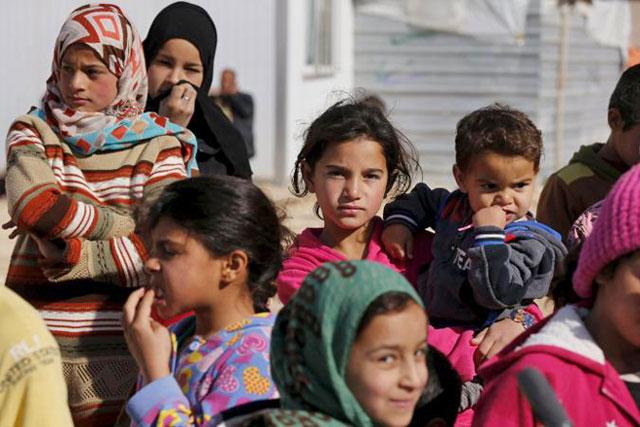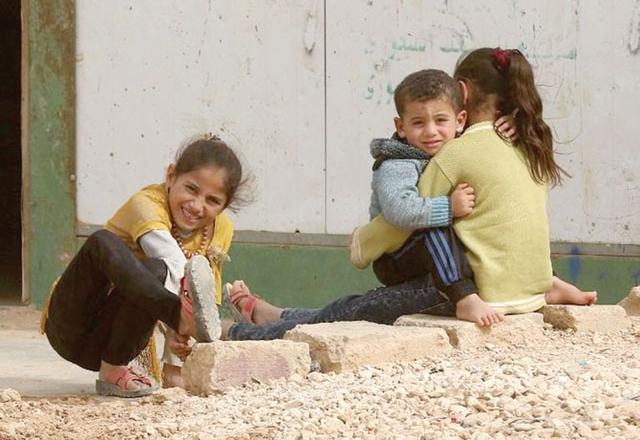You are here
61 INGOs in Jordan urge ‘equitable share of responsibility’ towards Syrian refugees
By Camille Dupire - Oct 01,2018 - Last updated at Oct 01,2018

The situation of Syrian refugees has been compounded by the difficult economic situation in Jordan (Reuters photo)
AMMAN — Sixty-one international non-governmental organisations (INGOs) working in Jordan have called for stronger international solidarity and responsibility towards the refugee crisis, urging both the government of Jordan and the international community to “follow through on their commitments made in Brussels and London”.
Participating at the 73rd Session of the UN General Assembly in New York, representatives of the Jordan INGO Forum (JIF) stressed the need for donors to “shoulder their responsibilities towards host countries”, a JIF official told The Jordan Times.
“Three years after the much-lauded Jordan Compact, the promise to invest in refugees to boost economic development and opportunities in Jordan has not been met. The hoped-for benefits for Syrians and Jordanians have not fully materialised and the scale of the needs of Syrian refugees remains staggering,” JIF representative Stef Deutekom said in his speech at the UN General Assembly.
“Eight years in exile, Syrian families have exhausted their savings and accumulated insurmountable levels of debt just to make ends meet,” Deutekom continued, stressing: “We call on the government to open more sectors in the labour market to Syrian refugees to allow them to formalise their existing work status, as well as create practical, legal pathways for them to register and own businesses. Jordan needs Syrians, especially women and youth, to access work opportunities, create value, spend in the local market and thereby contribute to the economy as the compact originally intended.”
Signed in February 2016 by Jordan and the global community to improve the resilience of refugees and host communities in Jordan, the Jordan Compact entails the provision of financial aid to the Kingdom, in exchange for Syrian refugees’ facilitated access to the labour market, according to relevant literature.
“The government of Jordan has put in place the foundations for turning the crisis into economic opportunities, by providing legal and civil documentation to Syrian refugees, including to tens of thousands more this year, and allowing access to a work permit,” a JIF statement sent to The Jordan Times said, adding: “This shift of paradigm, recognising that refugees bring expertise, capacities and opportunities and not only needs, must be acknowledged by all.”
The JIF stressed however that this paradigm shift “has not yet translated into job creation and inclusive growth for Syrian families as refugees remain highly vulnerable, dependent on informal work and humanitarian aid”.
The forum highlighted that the plight of refugees has been made even more difficult in light of the prevailing economic challenges confronted by Jordan, citing reduced subsidies for Syrian refugees’ healthcare which has caused medical costs to triple.
“The introduction of the new policy has immediately increased the pressure on ordinary Syrian refugee families who are already struggling to make ends meet. Refugees are forced to reducing their visits to the doctor, interrupting treatment but also contracting more debts, cutting spending by sometimes removing children from school or moving to substandard shelters in order to pay for treatment,” the statement read.
For Deutekom: “This change is undercutting the progress that Jordan had made in getting Syrian refugees back on their feet. Now they are sliding backward and forced into making heart-breaking decisions. A decent medical coverage of thousands of refugees cannot be regained without additional and long-term funding from the donors’ community.”
Commending the “immense generosity” Jordanians have demonstrated in hosting refugees from Syria and other countries, despite the strain on its economy, he said the JIF joins Jordan in asking for multi-track efforts in development support and humanitarian assistance.
“The international support, however, has to be more than just financial. A frank dialogue needs to take place between the government and its donors on the protection issues that Syrian refugees still face,” the statement noted.
“The international community should work with the government of Jordan to alleviate suffering for this population and continue to improve the quality of asylum — a value that strongly resonates in Jordan,” Deutekom concluded.
Related Articles
AMMAN — Pfizer-BioNTech donated vaccines to refugees residing in Jordan, as part of the company’s bilateral agreement and collaboration with
AMMAN — As the 73rd Session of the UN General Assembly continues its meetings in New York, humanitarian actors working in Jordan on Monday i
AMMAN — The members of an independent network of international non-governmental organisations (INGOs) operating in Jordan this week started













